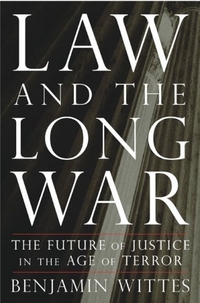

Purchase
The Future of Justice in the Age of Terror
Penguin Press
June 2008
On Sale: June 19, 2008
320 pages
ISBN: 159420179X
EAN: 9781594201790
Hardcover
Add to Wish List
Non-Fiction
Product Description
Benjamin Wittes offers the first nonpartisan critique of a
crucial front in America’s war on terror—the legal battles
fought by and among the Bush administration, the U.S.
Congress, and the Supreme Court Six years after the September 11 attacks, America is losing
a crucial front in the ongoing war on terror. It is losing
not to Al Qaeda but to its own failure to construct a set
of laws that will protect the American people—its military
and executive branch, as well as its citizens—in the midst
of a conflict unlike any it has faced in the past. Now, in
the twilight of President Bush’s administration, Brookings
Institution fellow Benjamin Wittes offers a vigorous
analysis of the troubling legal legacy of the Bush
administration as well as that of the U.S. Congress and the
Supreme Court. Law and the Long War tells as no book has
before the story of how America came to its current impasse
in the debate over liberty, human rights, and
counterterrorism and draws a road map for how the country
and the next president might move forward. Moving beyond the stale debate between those fixated on the
executive branch as the key architect of counterterrorism
policy and those who see the judiciary as the essential
guarantor of liberty against governmental abuses, Wittes
argues that the essential problem is that the Bush
administration did not seek—and Congress did not write—new
laws to authorize and regulate the tough presidential
actions this war would require. In a line of argument that
is sure to spark controversy, Wittes reveals an
administration whose most significant failure was not that
it was too aggressive in the substance of its action, but
rather that it tried to shoulder the burden of
aggressiveness on its own without seeking the support of
other branches of government. Using startling new empirical
research on the detainee population at Guantánamo Bay,
Wittes avers that many of the administration’s actions were
far more defensible than its many critics believed and
actually warranted congressional support. Yet by resisting
both congressional and judicial involvement in its
controversial decisions, the executive branch ironically
prevented both of those branches from sharing in the
political accountability for necessary actions that
challenged traditional American notions of due process and
humane treatment. Boldly offering a new way forward, Wittes concludes that
the path toward fairer, more accountable rules for a
conflict without end lies in the development of new bodies
of law covering detention, interrogation, trial, and
surveillance. Sure to discomfort and ignite debate, Law and
the Long War is the first nonideological argument about a
controversial issue of vital importance to all Americans.
Comments
No comments posted.
Registered users may leave comments.
Log in or register now!
| 


 © 2003-2025 off-the-edge.net
all rights reserved Privacy Policy
© 2003-2025 off-the-edge.net
all rights reserved Privacy Policy